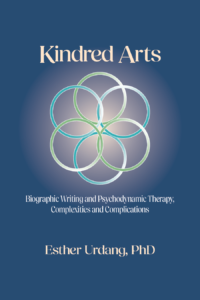
ClicK Here to Purchase: Kindred Arts: Biographic Writing And Psychodynamic Therapy, Complexities And Complications by Esther Urdang from IPBooks
Click Here to Purchase: Kindle eBook now available on Amazon!
You have never read a book like this before.
While you’ve certainly read clinical books and biographies—and maybe even books about biographies—I feel certain that you’ve not read a book that brings to your attention the considerable overlap between these two endeavors.
. . . Urdang, a clinical social worker who has practiced in agencies, in hospitals, and privately, demonstrates her scholarship in both the literary and clinical worlds. As she admits . . ., “I am a clinical social worker and social work educator. I am also hopelessly addicted to biographical writings”
. . . . In bridging these two fields, [she] reminds us of the importance of biographical study . . . as a counterweight to current trends . . . that favor evidence-based, quantitative measures, at the expense of exploring the past, developing empathy, and understanding experiential worlds . . .
Urdang has three goals . . . to emphasize . . . the life course perspective, to explore methodological issues embedded in constructing biographies, and to illuminate the relationship of the biographer to the subject. . . . “All biographies are autobiographies” . . ., Urdang tells us, and she powerfully illustrates this by describing the relationship between author Charlotte Brontë and her biographer Elizabeth Gaskell. . . .
The book is divided into ten chapters that focus primarily on the lives of Charlotte Brontë; Ved Mehta, the contemporary Indian writer . . .; Sir Arthur Conan Doyle; Frederick Douglass; and Rudyard Kipling. Sprinkled throughout . . . are illuminating stories about . . . the lives and biographies of . . . Edgar Allen Poe, Helen Keller, Erik Erikson, . . . J. D. Salinger, James Joyce, and Oscar Wilde.
The book begins with . . . the history of biographies and autobiographies, . . . a voyage from the Greeks and Romans through the Middle Ages through the Renaissance . . . the Victorian age and into the twentieth and twenty-first centuries. Urdang intersperses her commentary with psychodynamic theory and well chosen clinical vignettes, . . . she convincingly demonstrates that biographers and clinicians must, through empathy and insight, come to have a deep engagement and identification with their subjects. Also, as one learns about the life of another, whether through biographical reading or clinical listening, one must be mindful that a measure of deception and evasion is to be found in all storytelling . . . .
Urdang’s subjects are well-chosen. Their lives are often a mixture of pathos and triumph. . . . Sir Arthur Conan Doyle, creator of the immortal Sherlock Holmes, . . . Another chapter is devoted to the life of Frederick Douglass, social reformer, abolitionist, orator, writer, and statesman. . . . the complexities of his relationships with his wife, children, and lovers, with a focus on the fate of his ultimately tragic relationship with Ottilie Assing . . . the life of Rudyard Kipling, . . . . Kipling, at age six, was placed with his sister in a private English foster home that Kipling would refer to as the “House of Desolation.” . . . As [she] wisely notes, resilience and vulnerability are not either/or. We find in Kipling’s life the coexistence of both.
Why read biographies? Likely, we obtain the same pleasures as we do from learning about our patients. [Urdang] quotes Conway (1998), “We want to know how the world looks from inside another person’s experience, and when that craving is met by a convincing narrative, we find it deeply satisfying.” . . . Readers of this book, whether clinicians or students of literature, will readily discover such satisfactions, thanks to the erudition and clinical acumen of its author.
(Source of this review:
https://www.aapcsw.org/pdf/
About the Author
Esther Urdang, PhD (Simmons), MSS (Adelphi), LICSW, has practiced for many years in mental health and family agencies, hospitals, and private practice. At Boston College Graduate School of Social Work for 27 years, she taught clinical courses as Adjunct Associate Professor and was Assistant Director of Field Education. Subsequently, Dr. Urdang was a Research Advisor at Smith College School for Social Work. Her published papers include In Defense of Process Recording, The Discipline of Faculty Advising, The Video Lab: Mirroring Reflections of Self and the Other, Becoming a Field Instructor: A Key Experience in Professional Development, and Awareness of Self-a Critical Tool. She has received the Simmons Alumni Special Recognition Award for her writing, twice for papers and once for the first edition of her textbook: Human Behavior in the Social Environment: Interweaving the Inner and Outer Worlds. She she has written its third edition for Routledge Press.
